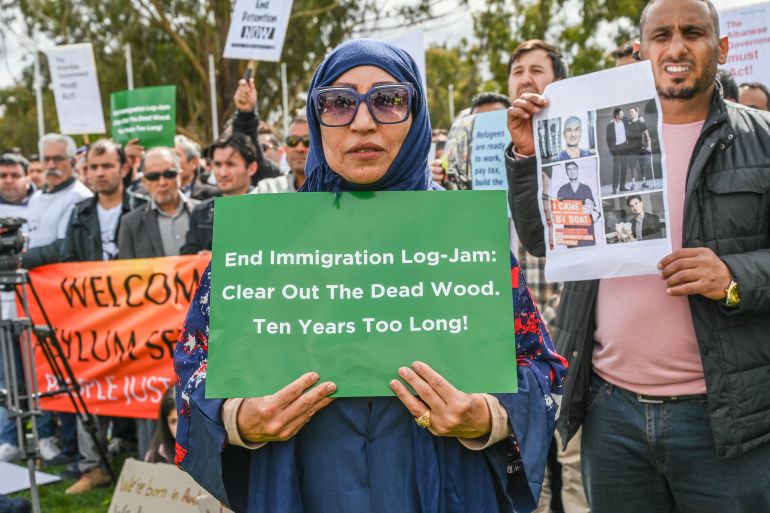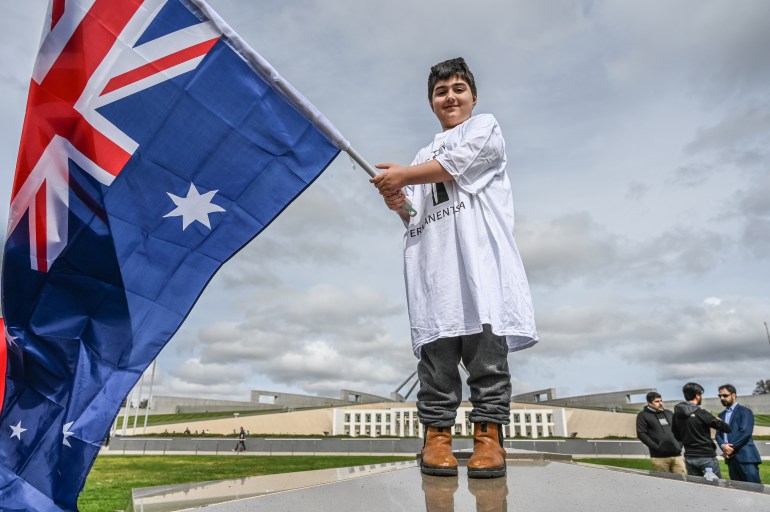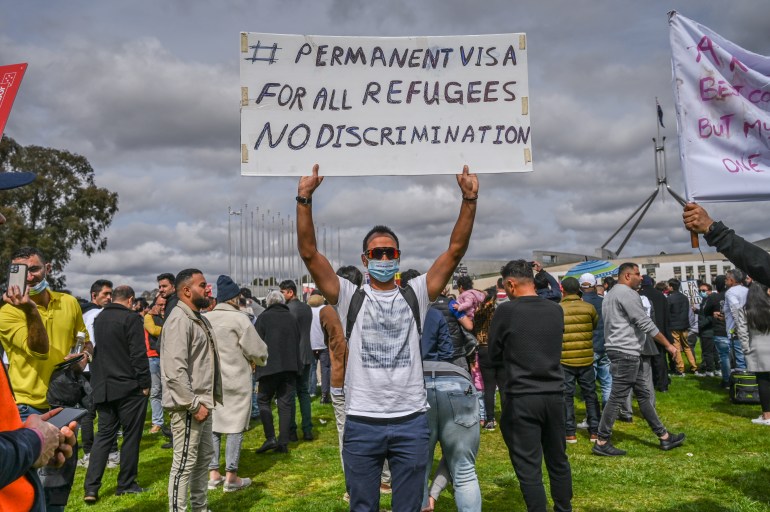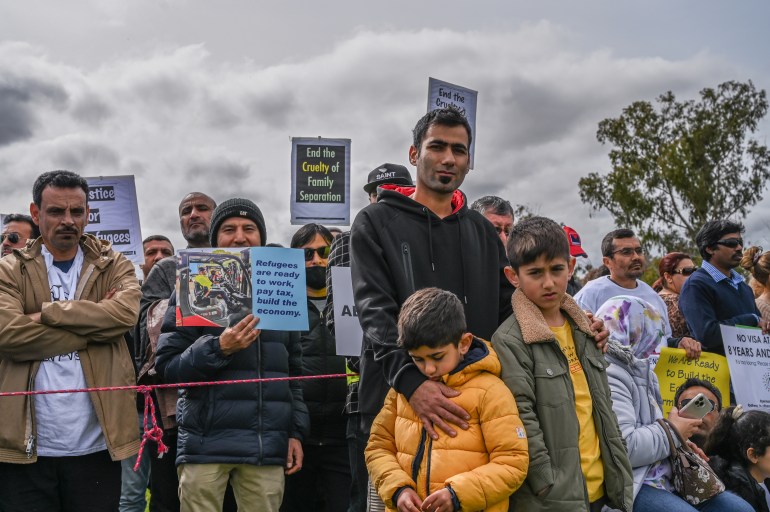‘Too much’: Refugees rally for permanent visas in Australia
Government has promised to abolish temporary visas that have left thousands struggling to survive, but has given no timeframe.

Canberra, Australia – Refugees in Australia are stepping up pressure on the three-month-old government of Prime Minister Anthony Albanese to deliver on a promise to give them permanent protection visas that would allow them to work and study and live more normal lives.
More than 1,000 refugees, advocates and activists converged on Parliament House on Tuesday to press their case.
Keep reading
list of 4 itemsKurdish refugee nominated for top Australian art prize
The Ukrainian refugees who made it to Australia
New Zealand to take 450 refugees from Australian detention
“We’re here because we want action, we want change. We want to be acknowledged within this community,” said Mostafa Faraji, a speaker at the rally in Canberra.
At the moment, there are 31,000 refugees living in Australia on various temporary visas that put limits on their lives – whether it is for work, study or family relationships.
In the run-up to May’s election, Albanese’s Labor party promised to abolish some of the temporary visas and provide permanent protection in their place.
During the protest, Minister for Immigration, Citizenship, Migrant Services and Multicultural Affairs of Australia Andrew Giles, posted a statement on social media reiterating the promise and saying it would be fulfilled “as soon as possible”.
Temporary protection visa holders deserve stability and assurance for their futures – to grow their businesses, buy houses, study and gain secure employment – many of them in regional areas.
— Andrew Giles MP (@andrewjgiles) September 6, 2022
There are three types of temporary visas for refugees in Australia: Temporary Protection Visas (TPVs), Safe Haven Enterprise Visas (SHEVs) and bridging visas. The government has promised to abolish TPVs and SHEVs.
These temporary visas are given to refugees who arrive without valid protection visas, typically coming by boat. When the holder’s temporary visa expires, their protection claim is reassessed and their visa has a possibility of being extended.
A SHEV holder could apply for a permanent visa, “but in the whole history of SHEVs only two have met the strict language [requirements] and been eligible,” Ian Rintoul, a political activist and spokesman for the Refugee Action Coalition, told Al Jazeera.
Someone with a TPV cannot apply for a permanent visa at all.
The visas also put constraints on people’s potential to work and study.
While TPVs and SHEVs allow the holder to do both – and to pay tax – visa holders often find higher-paid jobs are out of reach.
People on TPVs or SHEVs are typically limited to studying as international students, which means they have to pay exorbitant fees, said Faraji, who is studying for degrees in law and nursing.
To pay for his studies, and “to survive”, he has had to get any job he can, from driving Uber to working as a security guard.

The reality is, that many employers do not accept temporary visas, he said.
“They either ask for student visa, they either ask for permanent protection or citizen visa, or work skilled visa,” said Faraji. “So, therefore, your job opportunities … it’s restricted.”
One refugee at the protest, who asked to remain anonymous for his family’s safety, has two master’s degrees from his home country, one in political science and the other in philosophy. His wife also has a postgraduate qualification but they have been forced to work in basic, low-paying jobs because that was all they could find.
He recounted years of menial work, from farms to kitchens.
“I remember four or five months I worked for somebody but they didn’t pay [me], and I got the lowest rate 7 or 8 Australian dollars ($5 – $5.50) per hour in that hard job,” he said. “We used to work in farms, picking and packing, and it was too hard in muddy area[s] with that payment and no insurance, nothing, if something happened to us.”
People on temporary visas also have limited access to state benefits, known as Centrelink, and state-funded medical care (Medicare), if they have access at all.
“People on TPVs and SHEVs have access to Medicare and Centrelink … [but] they are not eligible for the pharmaceutical benefits scheme,” Rintoul said. “People on bridging visas … cannot access Centrelink. If they have the right to work (some bridging visas don’t allow employment) they can usually access Medicare, but not always.”
Another protester, a refugee who lives with schizophrenia, said he is not able to access medication because his Medicare cover is for emergencies only so does not include the medication he needs.
“I have a permanent health issue which is not something I can do anything about other than taking my medication,” he said. “Sometimes I feel like I am being treated like an animal.”
Pain of separation
Then there is the pain of separation from the close family they cannot bring to Australia.
Alex, a Hazara refugee from Afghanistan, drove 14 hours from Brisbane to be at the protest.

Using a nickname for the safety of his family, he told Al Jazeera the temporary visa policy had “destroyed” his life.
“I was working hard to save money to support [my family] in a good condition,” he said, “but because [of] the separation for 10 years, they slowly, slowly, step by step, they lose their feeling about me.”
Alex and his family fled Afghanistan to a neighbouring country approximately 25 years ago when the Taliban gave them three choices: convert to Sunni Islam, get out of the country, or let the Taliban “choose for you”.
“I [tried] many ways to find a legal way to came to Australia … with my family together,” he said. “But unfortunately, all the doors and options [were] locked and closed for me.”
He travelled to Australia by boat in 2012 with his wife’s support.
But over the years of being apart – thanks to the temporary visa – their relationship has deteriorated.
“The people are in this [Parliament] House … they just look like humans,” he said of the Australian government. “They look like human[s] but their actions, the things they are doing, we can see they are terrible.”
Activists say the abolition of TPVs and SHEVs would be a welcome first step, but Australia needs to do more to make its immigration system more humane.
“It’s just the tip of the iceberg …the iceberg of unfairness and injustice that applies to thousands of people being in the community,” said Rintoul, “Many of them are living, working and paying enormous amounts of tax and GST, but eking out an existence on the fringes of legal society.”
Rintoul points to regulations such as Direction 80, which says that applications for family reunions by people who came to Australia by boat will be treated with the lowest priority.

Then there are refugees who have no visas at all because their visas have expired, he said. These people are barred from work or study, or access to government payments and state-funded medical care.
“I would say there are several thousand Tamils, Iranians and Afghans who are living in the community on expired visas … they’ve got nothing, there’s no income … they are unlawful,” he said. “They rely on the refugee organisations and mostly they rely on their own communities.”
Sam, as his friends know him, is one of them.
He has lived the best part of his life in limbo. “I was 25 [when I came], I’m 38 now,” he said, taking off his cap to show his grey hair.
“I haven’t seen my family for 12 years. I lost two members of my family, I didn’t see them,” he said.
Like those of so many other refugees, his case is complicated. He was told to return to his country, but he is stateless, so he cannot go “home”, he said.
In fact, after more than 10 years in Australia, Sam, like so many other refugees in the country, feels that it is Australia that is his home.
This was a big part of the protest, explained organiser Arad Nik – to “tell people we are … Australian”.
“We want to share [a] beer with all the mates in this amazing, beautiful country,” he said, stressing that refugees bring with them skills, knowledge and culture. “Refugee is not a problem, refugee is a solution.”
But until the Australian government begins to change its policies towards refugees, it seems many will not only be separated from their old home but will also remain aliens in their new land.